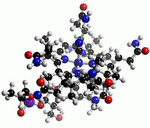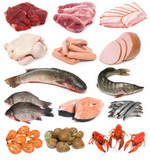|
Vitamin B12 – Unique Cobalamin CompoundVitamin B12 is part of a group of cobalt containing compounds called cobalamins. Cobalt is part of the nutrients referred to as minerals. Unlike other B vitamins, plants don’t make the vitamin, and it is also unique in that it helps with the synthesis of another B vitamin, folate or vitamin B9. The vitamin is however stored in large amounts in the body.
Vitamin B12 Molecule
The vitamin is present in some foods but added to others, is also a dietary supplement and a prescription medication used to treat pernicious anemia which results when there is a B12 deficiency. Vitamin Absorption Absorption of the vitamin from the diet is easy, but once it gets into the body, there are a number of steps that it takes to get through the digestive tract. The vitamin binds to a protein that is produced by the salivary glands, then the vitamin travels from the stomach to the small intestine, there a pancreatic compound such as trypsin removes the vitamin from the protein that it bound with, then binds with another molecule called intrinsic factor next going to the ileum of the small intestine, the vitamin next is transferred to a carrier protein called transcobalamin II and enters the blood stream being delivered to the liver, bone marrow, and developing blood cells. A problem at any point along this pathway can result in a deficiency. Dietary Recommendations The recommended dietary allowance (RDA) for the vitamin for men and women aged 19-50 is 2.4 micrograms/day, and is the same amount for adults over 51. Vitamin Sources The naturally occurring vitamin is produced by bacteria, and it is obtained by animal sources from bacteria on their food or they make it in their intestinal bacteria, then the vitamin is stored in the animal’s liver which means that liver is a rich source of the vitamin, but not many people consume liver. As a result many humans obtain the vitamin from fortified foods such as soy products and ready to eat cereals. Vitamin B12 Foods
Vitamin Deficiency Humans also store the vitamin in the liver, enough for two years. Therefore, those that are generally at risk are those that are vegetarians, since the vitamin is not made by plants and only small amount are found on plant foods from other sources. Inadequate intake or problems with absorption can occur in older adults, requiring supplementation in the form of a monthly B12 shots. The vitamin can also be obtained through mega doses as a supplement. When absorption of the vitamin is impaired, then the deficiency is manifested by tingling and numbness in the extremities, abnormal gait, and cognitive changes resulting from loss of concentration, memory loss, disorientation and dementia. The major cause of B12 deficiency is pernicious anemia which results from an autoimmune disorder that causes damage to the cells lining the stomach and inhibits the absorption of B12. Individuals with this deficiency are at a higher risk for stomach cancer. The deficiency can be reversed with vitamin B12 injections within in a matter of days, but if not treated the disease is fatal. Vitamin Toxicity High levels of the vitamin especially in the high levels needed to treat pernicious anemia have not been shown to be toxic in healthy people, thus toxicity is basically unknown.
For other information on nutrition, and vitamins in particular some great references are: • Nutrition – Fourth Edition by Paul Insel, Don Ross, Kimberley McMahon, and Melissa Bernstein
Vitamins
|







